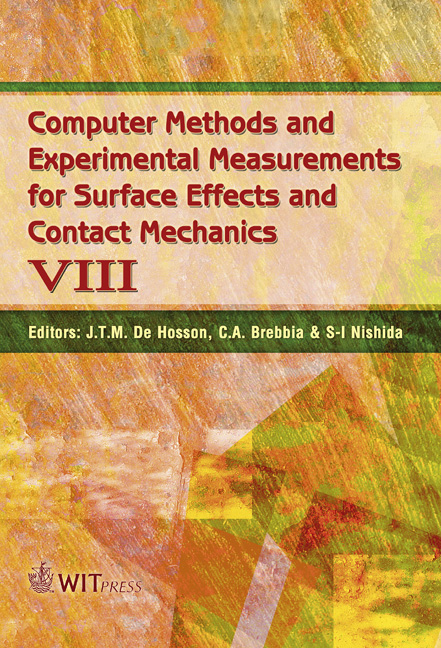Determination Of Potential Function In Contact Problems
Price
Free (open access)
Transaction
Volume
55
Pages
10
Published
2007
Size
569 kb
Paper DOI
10.2495/SECM070221
Copyright
WIT Press
Author(s)
F. Sharafbafi & S. Adibnazari
Abstract
In this paper, a relation is introduced that simplifies the determination of the Muskhelishvili’s potential function in plane contact problems. The relation is )] ( ) ( [ 2 / 1 ) ( z iq z p z − = Φ , which is correct for all uncoupled-elastic contact problems. This relation is proved in a mathematical way and utilized to obtain the potential function in several contact problems. A complete agreement has been observed between our results and the potential functions that have been obtained from complicated methods in the past. Utilization of the relation simplifies the solution of contact problems and analytical calculation of the stress and displacement fields, which is helpful in the analytical studies of contact mechanics. It also may lead to the design of better cutting tools or fretting fatigue test pads. Keywords: contact mechanics, uncoupled-elastic plane contacts, analytical solution, Muskhelishvili’s potential function, a simple relation. 1 Introduction A routine procedure for solving analytically plane contact problems is the following: find pressure and shear distributions from the contact fundamental equations and substitute those into the Muskhelishvili’s integral equation to obtain the contact potential function. The contact stress and displacement fields are achievable through the determined potential function [1–3]. Since the Muskhelishvili’s integral equation is a complex singular integral equation, calculation of the potential function, in this way, is not so simple. Therefore, the closed-form potential function of a few contact problems has been obtained. For a contact problem with complicated geometry, there are other procedures to
Keywords
contact mechanics, uncoupled-elastic plane contacts, analytical solution, Muskhelishvili’s potential function, a simple relation.





